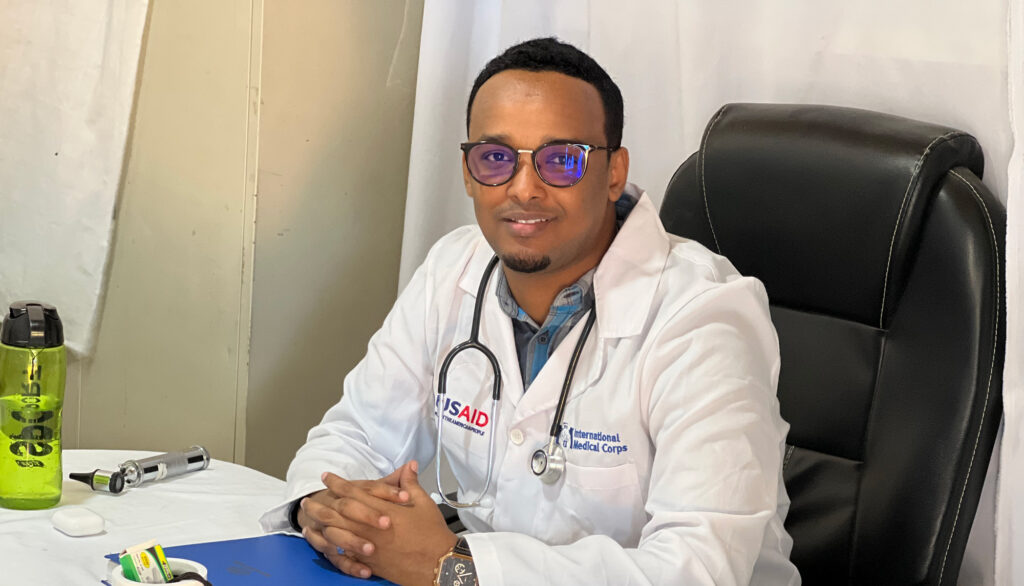With the ongoing conflict in Somalia, the country’s health system—suffering from years of neglect—has become strained and overburdened. Because the existing health system is underfunded and inadequate in both coverage and capacity, unregulated private healthcare providers have been left to fill some of the gaps. As a result, access to essential health services is a privilege available only to a few, as the cost of quality healthcare is unaffordable for most. With low access to sufficient reproductive health services, Somalia has one of the highest maternal mortality rates in the world (732 deaths per 100,000 live births) and a high infant mortality rate.
Dr. Omar Abdulrahman Jama understands this all too well. He currently works in obstetrics and gynecology at the International Medical Corps-supported Wadajir Health Center in Mogadishu. Omar is a strong advocate and supporter of free high-quality healthcare services for all, but it wasn’t until he joined one of the private healthcare providers that he came to learn how the health system disadvantages the poor—especially women and children who are the most vulnerable in society.
“During my short stint working at private hospitals, it was always disheartening seeing how patients were often turned away due to their inability to afford medical treatment services,” Omar says. “That’s when I realized I wanted to be an agent of change for my community.”
Omar has always wanted to be a doctor. Born and raised in Mogadishu, he was greatly inspired by his older brother, who is also a medical doctor. Omar followed in his footsteps by enrolling for his medical degree in general surgery at the University of Mogadishu. After graduating from the university, he decided to specialize in obstetrics and gynecology because he saw that women and children in Somalia are the most marginalized groups when it comes to accessing quality healthcare.
After extensive research, he decided he wanted to join a hospital that offered free medical care—preferably a nonprofit-supported health facility with maternal services. In 2015, Omar joined an International Medical Corps-supported health facility in Abudwaak, in Galmudug state, and later moved to the facility in Jowhar. In 2017, he received another transfer to Wadajir Health Center, which operates on a 24-hour basis and serves more than 200 people each day.
The facility offers a wide range of inpatient and outpatient services that include basic emergency obstetric and neonatal care, comprehensive emergency obstetric and neonatal care, and antenatal and postnatal care consultations. It also serves the local community by providing an integrated package that includes health, nutrition, protection, and water, sanitation and hygiene (WASH) interventions. International Medical Corps supports the districts of Galkacyo, Jowhar and Baidoa with this package.
As the main obstetrician-gynecologist at the Wadajir Health Center, Omar helps midwives and nurses offer safe delivery services to expectant mothers. He also handles complicated emergency antenatal and postnatal cases, and is in charge of on-the-job training at the facility.
Omar is happy to report his team’s successes at the facility, especially in offering quality healthcare services to the communities they serve, and he is pleased to note that the facility ranks high on safe deliveries in Mogadishu. “Our maternity wing—which has 15 health staff—records an average of 70 safe deliveries per week, a clear indicator that our services are well-trusted by the community,” Omar says.
But even with these achievements, Omar noted a few challenges that continue to undermine the facility’s efforts. “Most of the time, we are forced to refer patients to other hospitals for specialized services not offered in Wadajir Health Center. Unfortunately, almost none of these referral facilities offer services for free. Since most of our patients come from humble backgrounds, they cancel the visits due to lack of money,” he says.
Insecurity is also a significant hindrance to their work. “Due to poor security, we often experience unplanned road blockades that greatly deter patients from seeking medical assistance. It is particularly hard for us when some cases require urgent attention. The delay almost always endangers the patient’s life.”
Nevertheless, Omar says that the staff remain optimistic and are highly encouraged when they see their patients happy and healthy. “Just the other day, we were all celebrating when my team and I assisted a woman who was about to go into labor—and, unbeknownst to her, she was pregnant with triplets,” he says. “This case was startling since we later learned that she had never attended any antenatal-care session since the start of her pregnancy. Fortunately, she delivered safely, and we later moved her to the postnatal-care unit for close supervision. I am proud to note that these were the first triplets to be delivered in this facility.”
